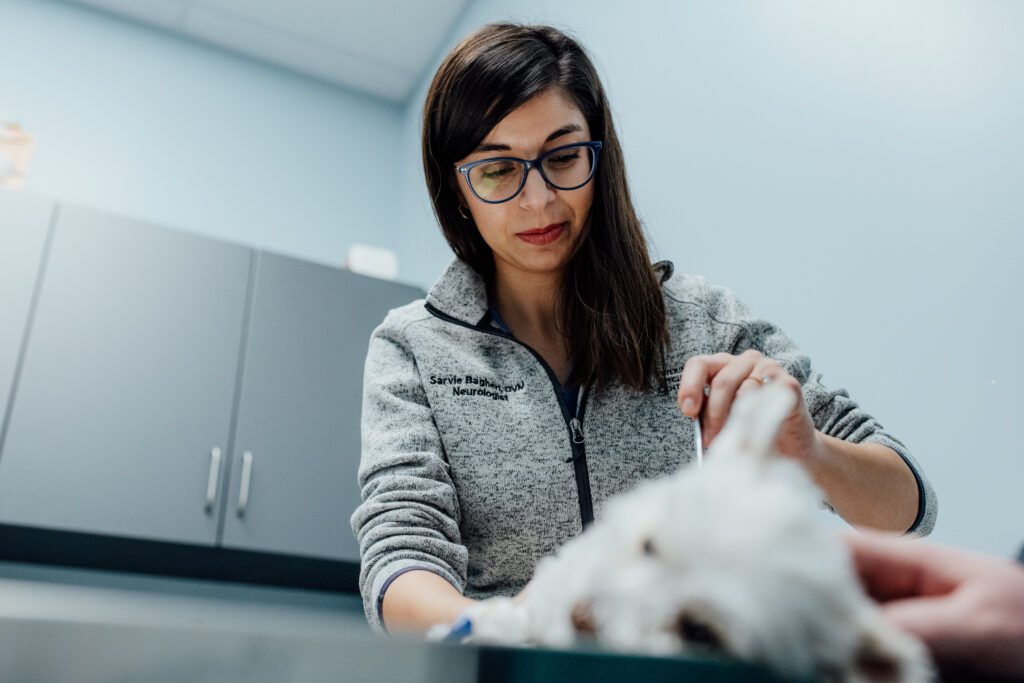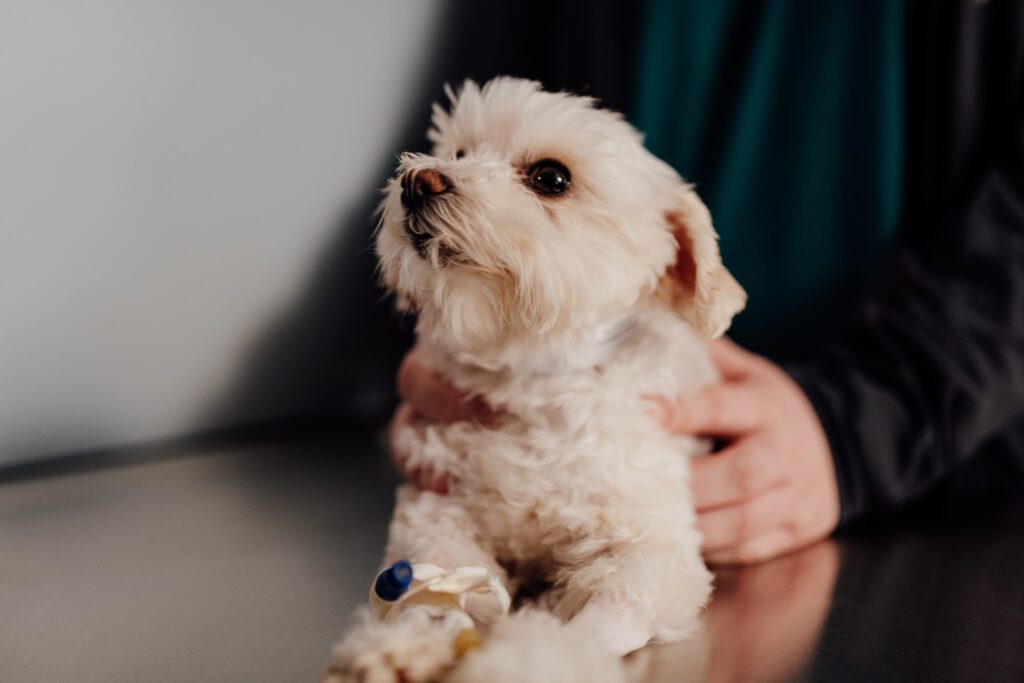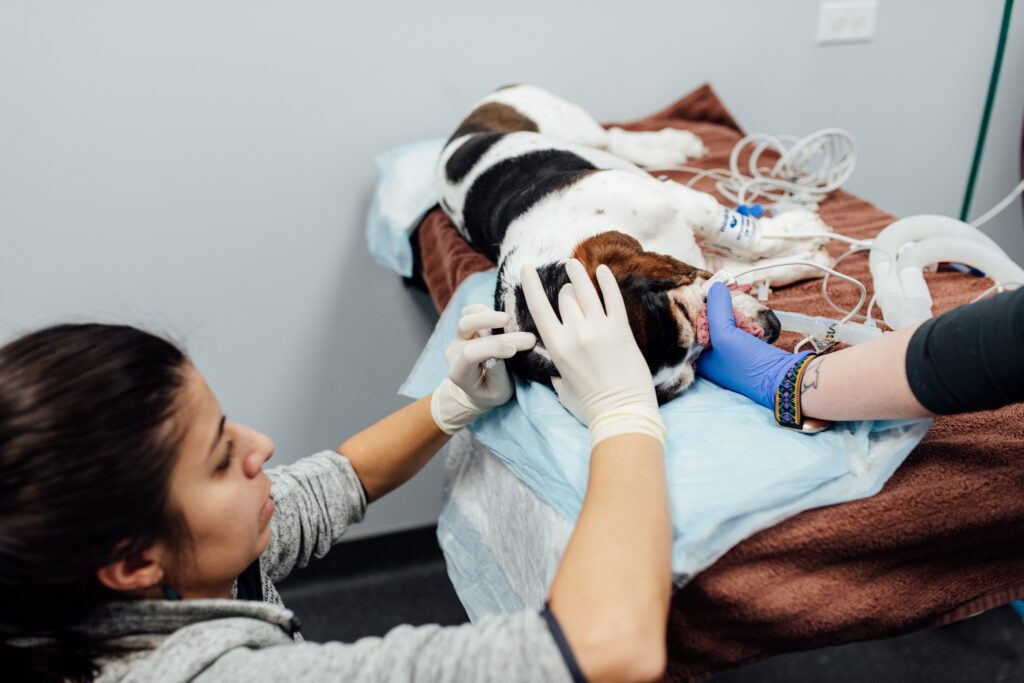What to Expect-Neurology
Neurology/Neurosurgery
 Dr. Sarvie Bagheri is a board-certified neurologist and neurosurgeon, specializing in the diagnosis and treatment of disease processes that affect the brain, spine, muscles, and peripheral nerves.
Dr. Sarvie Bagheri is a board-certified neurologist and neurosurgeon, specializing in the diagnosis and treatment of disease processes that affect the brain, spine, muscles, and peripheral nerves.
Neurologists treat many conditions such as intervertebral disc disease, congenital or developmental malformations of the brain and/or spinal cord, tumors of the nervous system, autoimmune disease, vestibular disease, degenerative myelopathy, seizures, and traumatic brain or spinal injury.
Dr. Bagheri works in conjunction with the surgery, radiology, internal medicine, critical care, oncology, and rehabilitation departments since oftentimes neurological conditions also have underlying or complicating medical problems. Treatment plans may include medical management, physical rehabilitation, and brain or spinal surgery.
Initial consultation – Your neurology visit will start with a consultation, which includes a physical and neurologic examination of your pet, review of all information sent by your primary care veterinarian and discussion of the pertinent history. The exam involves the evaluation of vision, behavior, neck and back pain, spinal reflexes, postural reactions, nerve function, and evidence of weakness or paralysis to localize the problem to a specific part of the nervous system. Dr. Bagheri will discuss your pet’s condition, possible causes for your pet’s clinical signs, diagnostic testing, treatment options, and prognosis. Prior to any treatment, a patient care plan with a cost estimate will be provided based on this discussion.
We understand that each pet is unique and will work with you to find the best treatment option for your pet and family situation. During this time, you will have the opportunity to ask questions about the benefits and risks of the procedure, follow-up, and expected outcomes.

Appointments – Neurology workups can be lengthy. Please allow 1 hour for the first consultation with the neurology team. Some advanced testing may require hours to complete, therefore the entire visit may take all day. Sometimes a patient may require an overnight stay, particularly if anesthesia is necessary.
Common diagnostics that may be used in diagnosing your pet:
- Laboratory procedure – Includes, but is not limited to, complete blood counts, biochemistry profiles, immune-mediated disorders, and infectious disease testing.
- Cerebrospinal fluid (CSF) analysis – Fluid is collected from a space around the brain and spinal cord and then analyzed to aid in determining the mechanism of a central nervous system disorder, especially inflammation.
- Digital radiographs (x-rays) – Radiographs are used in the initial diagnostic phase. They provide a general assessment of the vertebral column prior to performing advanced imaging tests such as CT or MRI. They are also used as a screening tool for cancer and other chronic diseases.
- Magnetic Resonance Imaging (MRI) – MRI is considered the “gold standard” for evaluating the central nervous system. Our 3 Tesla MRI unit provides high-resolution, multi-plane images allowing us to visualize soft tissue structures including the nervous system. It allows us to see physical abnormalities of the brain and spine.
- Computed Tomography (CT scan) – CT is used to create highly detailed, cross-sectional digital images of a portion of the body which is beneficial in evaluating bone (fractures, infections, tumors) and calcified intervertebral disc herniations.

Electrodiagnostics – If your pet has a disease of the peripheral nervous system or muscles, your pet may need to have electrodiagnostic procedures performed to aid in the diagnosis and treatment of your pet’s condition. An electromyogram (EMG) is used to record the electrical activity of the muscles. An electroencephalogram (EEG) is used to record the electrical activity of the surface of the brain. A brainstem auditory evoked response (BAER) is used to record electrical activity of the hearing pathway and is most commonly used to evaluate for deafness. Other procedures such as nerve conduction velocity, repetitive nerve stimulation, and evoked potentials may be performed depending on your pet’s needs.
Procedure times – Often we can perform surgery, MRI’s or CT’s the same day as your appointment. The starting times are determined based upon multiple factors including the case’s urgency, required diagnostics, and the number of procedures scheduled. A member of our team will notify you when a procedure is about to begin and Dr. Bagheri will update you with your pet’s findings and/or progress once the procedure is finished.
Fasting Instructions – To obtain accurate laboratory results and diagnostic images and for the safety of your pet during and after an anesthetic procedure, your pet needs to have an empty stomach. Please feed your pet a normal dinner but NO FOOD 12 hours prior to your appointment. Water is okay.
Special fasting instructions – Pediatric patients (less than 6 months of age) should not be fasted for more than 6 hours. Diabetic patients need to fast 12 hours prior to the appointment and receive half their insulin dose with no food the morning of the appointment. Please bring the insulin in its regular bottle along with your pet. For both pediatric and diabetic patients, water is okay. If your pet is on medications, please contact the VSC Neurology team to determine if the medications should be discontinued prior to your pet’s appointment.
Discharge information – When your pet is ready to leave the hospital, a veterinary nurse will review all of the home care instructions with you. You will be provided with a copy of the detailed discharge instructions to take home. If you have additional questions or concerns, please don’t hesitate to ask or call us anytime.
Follow-up care – While your primary care veterinarian can handle many aspects of your pet’s care, there are certain conditions and complex cases that require the ongoing management of a specialist. The Neurology team will discuss with you whether it is appropriate to follow up directly with VSC or your primary care veterinarian. All routine preventative care should continue with your primary care veterinarian.
If you choose to follow up with your primary care veterinarian instead, we are able to consult directly with them via fax or email if requested. Our specialist will communicate the next steps with your primary veterinarian within 3-5 business days of receipt of their communication. Your primary veterinarian will then discuss these results and our recommendations with you. If you prefer direct contact with our Neurology team or if you or your veterinarian feels there is a pressing concern about your pet’s condition, do not hesitate to make a follow-up appointment at Veterinary Specialty Center.
Questions or concerns – For any non-urgent questions, you will be asked to leave a message for the Neurology team or you can email them directly at: neurology@vetspecialty.com. If you have any urgent medical concerns outside the Neurology Department’s normal business hours, you can call our Emergency and Critical Care Department 24 hours a day (847.459.7535).
Patient care plan – Once you consent to a course of treatment, you will be presented with a patient care plan that includes an approximate range for the cost of diagnostics and care. You are required to leave 100% of the low end of the plan when your pet is admitted to the hospital or at the time of service.
Payment options – Accepted payment options include: cash, check, and credit card (Visa, MasterCard, Discover and American Express). Financing options are available through CareCredit for qualifying individuals. If you are interested in applying for CareCredit, please let a member of our team know or apply online at www.carecredit.com.
Prescription refills -To allow our staff to provide the in-depth care necessary for our hospitalized patients, we require 24 hours notice for prescription refills. There is a $25 fee for refills requested outside of the regular Neurology Department hours Monday through Thursday from 9 am – 5 pm.
Please note that Federal Law regarding refills of controlled substances have made it necessary for patient’s refills to be done in person. Per FDA regulations, dispensed medications may not be returned to VSC (CPG sec. 460.300).
